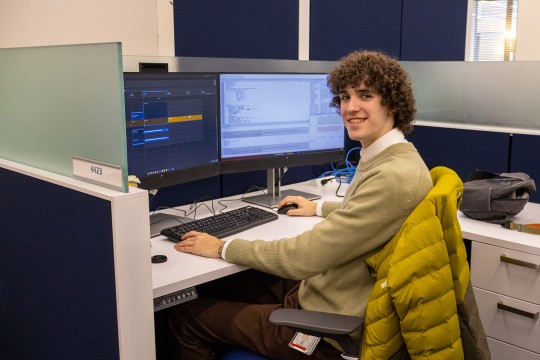
Michael Frank
Lecturer, Humanities Computing Design
Dean’s Office
College of Liberal Arts
Program Co-Director, Humanities, Computing, and Design BS
Office Hours
Click Personal Website for appointments
Office Location
Michael Frank
Lecturer, Humanities Computing Design
Dean’s Office
College of Liberal Arts
Program Co-Director, Humanities, Computing, and Design BS
Currently Teaching
DHSS-101
Computation and Culture
3 Credits
The course provides a basic introduction to the application of computation in the research and practice of the humanities, arts, and social sciences. The class offers students entry to work with archival theory and practice; textuality and electronic scholarly communication; data mining, analysis, and visualization; the spatial and temporal “turns;” game studies and digital arts. The course offers hands on experimentation with software platforms available to create scholarly and artistic production and theoretical approaches to digital presentation. Students will complete assignments requiring conceptual, aesthetic, and practical approaches to digital engagement with cultural materials. While no programming knowledge is required, students will design and create an online project using tools and platforms that are considered standard practice in the field, and reflect critically on the utility of digital techniques in their dialogue with the humanities.
DHSS-102
Industrial Origins of the Digital Age
3 Credits
The central focus of this course will be the excavation of textual, visual, and sonic materials, obsolete or emerging. The archaeological metaphor evokes both the desire to recover material traces of the past and the imperative to situate those traces in their social, cultural, and political contexts. How does the digital age imagine backwards to the Industrial Age and vice versa? Is it true that virtually everything that is being invented now for a digital age had its origins in the late nineteenth and early twentieth century industrial age? (inventions of telegraphy and telephony, electricity, photography, cinema, the automobile, the Dewey Decimal and Library of Congress classification systems, muckraking and sensationalist journalism, celebrity culture, the skyscraper, the office, the typewriter, the Brownie camera). We will take a research approach that explores moments in which both familiar and unfamiliar devices have yet to emerge as significant or disappear as curiosities.
DHSS-200
DHSS Seminar
1 Credit
This is a one-credit seminar course that assists DHSS majors in their professional development and prepares them to locate and obtain co-ops and jobs in their field. It also provides a forum for DHSS majors to receive feedback on their own creative projects in preparation for their senior capstones. Faculty and students will also discuss emerging events related to the field of DHSS. Students may take this course repeatedly for credit up to four times.
DHSS-377
Media Narrative
3 Credits
The contemporary understanding of communication and narrative is quickly shifting in a world where media is ubiquitous. The "language of new media" is the thematic used in this course to discuss contemporary and historic forms of non-linear narrative. Students will explore the properties of non-linear, multi-linear, and interactive forms of narratives. This course will survey some of the possibilities, examining both traditional and new media such as oral storytelling, literature, poetry, visual arts, museum exhibits, architecture, hypertext fiction, Net Art, and computer games. Writers on communication culture, gaming, television, digital aesthetics, contemporary art and film, as well as synchronic narrative will be addressed. The focus is to develop critical tools to analyze contemporary media as well as a minimal level of practical implementation. Students will produce a final media project.
DHSS-489
DHSS Capstone I
3 Credits
This course is intended for students in the DHSS program to produce critical and creative projects that apply digital technologies to a field of inquiry in the humanities and/or social sciences, while being guided by faculty advisors. Students will acquire a client (faculty member, not-for-profit organization, or cultural heritage site) and will be supervised by the advisor as they develop the research agenda, develop the project management plan, construct all necessary IRB materials, intellectual property documents, and copyright permissions, and develop a working prototype. This course will culminate in an online publishable project and a written rationale with theoretical grounding, as well as explanation of practical decisions and applications. It is expected that the project will be somewhat novel, will extend the theoretical understanding of previous work, and go well beyond any similar projects that they might have contributed to in any of their previous courses. The 6-hour course sequence is designed to be distributed over two consecutive semesters in order to allow for long-term, in-depth development of projects.
DHSS-490
DHSS Capstone II
3 Credits
This course is intended for students in the DHSS program to produce critical and creative projects that apply digital technologies to a field of inquiry in the humanities and/or social sciences, while being guided by faculty advisors. Students will acquire a client (faculty member, not-for-profit organization, or cultural heritage site) and will be supervised by the advisor as they develop the research agenda, develop the project management plan, construct all necessary IRB materials, intellectual property documents, and copyright permissions, and develop a working prototype. This course will culminate in an online publishable project and a written rationale with theoretical grounding, as well as explanation of practical decisions and applications. It is expected that the project will be somewhat novel, will extend the theoretical understanding of previous work, and go well beyond any similar projects that they might have contributed to in any of their previous courses. The 6-hour course sequence is designed to be distributed over two consecutive semesters in order to allow for long-term, in-depth development of projects.
In the News
-
February 13, 2026

Student finds co-op success in the transportation industry
Before coming to RIT, Jacob Brodeur didn’t know what other opportunities were available to him in the urbanism industry, but the skills and experiential learning opportunities he gained by studying humanities, computing, and design offered a new path.


